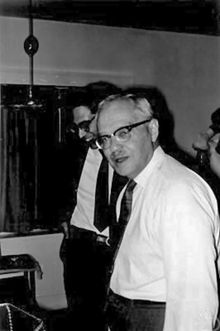Neyman
| Jerzy Neyman | |
|---|---|
 |
|
| Born |
April 16, 1894 Bendery, Bessarabia Governorate, Russian Empire |
| Died | August 5, 1981 (aged 87) Oakland, California |
| Nationality | Polish |
| Fields | Mathematics |
| Institutions |
Nencki Institute of Experimental Biology University College London University of California, Berkeley |
| Alma mater |
University of Warsaw Kharkov University |
| Doctoral advisor | Wacław Sierpiński |
| Doctoral students |
Wolfgang Bühler Douglas Chapman George Dantzig Lucien Le Cam Evelyn Fix Erich Leo Lehmann Anastasios Tsiatis Joseph Hodges |
| Known for | confidence interval, statistics of galaxy clusters |
| Notable awards |
Newcomb Cleveland Prize (1958) Guy Medal (Gold, 1966) National Medal of Science (1968) Fellow of the Royal Society |
Jerzy Neyman ForMemRS (April 16, 1894 – August 5, 1981), born Jerzy Spława-Neyman, was a Polish mathematician and statistician who spent the first part of his professional career at various institutions in Warsaw, Poland and then at University College London, and the second part at the University of California, Berkeley. Neyman first introduced the modern concept of a confidence interval into statistical hypothesis testing and co-devised null hypothesis testing (in collaboration with Egon Pearson).
He was born into a Polish family in Bendery, in the Bessarabia Governorate of the Russian Empire, the fourth of four children of Czesław Spława-Neyman and Kazimiera Lutosławska. His family was Roman Catholic and Neyman served as an altar boy during his early childhood. Later, Neyman would become an agnostic. Neyman's family descended from a long line of Polish nobles and military heroes. He graduated from the Kamieniec Podolski gubernial gymnasium for boys in 1909 under the name Yuri Cheslavovich Neyman. He began studies at Kharkov University in 1912, where he was taught by Russian probabilist Sergei Natanovich Bernstein. After he read 'Lessons on the integration and the research of the primitive functions' by Henri Lebesgue, he was fascinated with measure and integration.
...
Wikipedia
